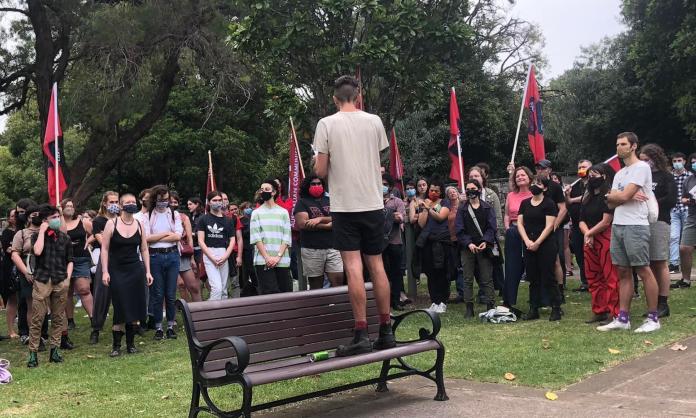Workers at independent Sydney bookshop Better Read Than Dead have been fighting all year to improve their pay and conditions. They were joined by more than 150 activists and unionists at a community rally last Friday in support of their ongoing industrial action.
This isn’t the first time that these workers have confronted management. Last July, during the state lockdown, the bookshop workers and the Retail and Fast Food Workers Union fought for an employment agreement that would provide a safe workplace, job security and a liveable wage. The store ground to a halt as workers refused to process web orders, complete returns or work overtime. The store’s front window display remained unchanged for months.
Management was forced to concede to the workers’ demands, at least in principle. Now it has reneged on its promises and refused to sign the agreement, sparking another round of outrage and industrial action.
Better Read Than Dead markets itself as trendy and progressive (its name is a play on a 1950s peace movement slogan opposing the anti-communist drive towards war), which is common among the small businesses of Sydney’s inner west. Despite the image, it’s an exploitative workplace like any other. The lefty gloss did not stop the bookshop from scrapping Sunday penalty rates, something that the workers are fighting to restore.
Nor did it prevent management from squeezing as much profit as possible out of the largely casual workforce. “Most of our staff are casual”, said Maddy, who works at the store. “That means they can be fired at any moment on the whim of Better Read Than Dead management, and that has happened a lot. We have a huge staff turnover.”
Maddy and her co-workers are demanding the abolition of junior rates, which she says have been used to underpay younger workers. “A lot of people who work in the store are under 21, and there’s a loophole in the award which means they can be paid a fucking pittance of a wage, and they’re doing the work that we’re all doing!”
Workers are demanding improvements to their conditions that extend beyond immediate concerns, including paid parental leave provisions. “A phrase that we use a lot is ‘everyone is doing this for everyone else’, so a lot of the rights that we’re fighting for don’t necessarily affect individuals at the moment”, one worker said after the rally. “None of us are pregnant at the moment or really want children right now. But it’s the principle of the thing.”
Even these seemingly basic rights are hard won in the industry. Only 9.6 percent of retail workers are unionised, and many workplaces do not have agreements, meaning that bosses can get away with supplying only the most basic conditions and some of the lowest pay grades.
But it doesn’t have to be this way. This campaign challenges the ubiquitous argument that casual workers cannot be organised because they’re too precarious and are unlikely ever to join a union or find the confidence to fight. “I think if this campaign demonstrates anything, it’s that casual workers are immensely invested in their rights at work”, says union organiser Loukas Kakogiannis. “If unions are willing to bargain, as we have at Better Read Than Dead, for all of their casual employees to be converted to part time, to have secure jobs, then casual workers are going to be invested in fighting.”
Despite management backtracking on the previous agreement, the overwhelming feeling among workers and supporters at the rally was a determination to continue fighting. “It’s really inspiring”, Zachary, an ex-worker at Better Read Than Dead, said as the rally marched past the shopfront. “It’s wonderful to see many former colleagues standing up, fighting back. I think the fighting is inspiring for workers in other industries, not just retail.”










